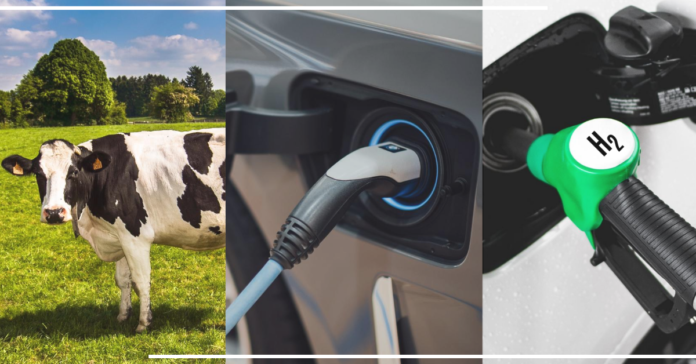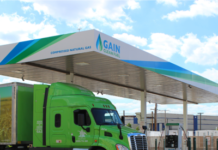Given the emergence in sustainability goals built around transportation-related emission reductions, leading fleets across market sectors are evaluating what fuel or combination of fuels work best for their applications. The good news is that many options exist. The bad news is that more choices translates to more uncertainty and pressure to select the right alternative fuel without sacrificing margin.
At U.S. Gain, we believe fuel should be tailored to meet your needs, not the other way around. As a tenured leader in the development and distribution of sustainable energy solutions that reduce emissions, we are here to help facilitate reductions in transportation-related emissions without sacrificing key performance metrics.
Specifically, renewable natural gas, electric and hydrogen are three tactics for emission savings that have significant roles in fleet decarbonization, while simplifying your polyfuel future. Below, we have detailed an initial overview of each solution.
Renewable natural gas (RNG)
Renewable natural gas, which you can read more about here, provides fleets with an immediate, effective solution. Not only does it offer unrivaled lifecycle emission benefits, but it is readily available and affordable. U.S. Gain has been involved in over 20 RNG development projects, where waste from agriculture, landfills and wastewater treatment plants is transformed into some of the cleanest fuel available – proven through unprecedented carbon intensity scores. This is advantageous to your fleet because the lower the carbon intensity score, the greater your emission savings.
In terms of implementation, a transition to RNG is easy. If your fleet is currently running on natural gas, no vehicle, station or fueling modifications are necessary. However, if your fleet is not natural gas-based, no need to worry. The associated technology is proven and ready to be deployed for your fleet, the infrastructure is established and accessible, and grant funding is available to make the transition financially feasible. As an added incentive, fleets operating in California and Oregon are eligible to receive clean fuel credits – enhancing the economic value proposition.
RNG is the most immediate solution to emission reductions. Whether your fleet is seeking new infrastructure builds or in need of renewable natural gas supply, U.S. Gain is equipped to be your partner during this transition.
Electric
Electric charging, explained in greater depth in this blog, is an emerging fueling concept that has been gaining traction within passenger and light-duty markets over the past year. Regarding the heavy-duty sector, critical developments are still under way as more fleets are beginning to test electric models.
Despite the adoption of electric charging solutions still being in its early stages, as technology and infrastructure availability advances, so will fleets’ implementation. The use of electric as an alternative fuel provides strong emission reduction opportunities that can aid fleets in meeting their sustainability goals. This is because electric vehicles feature zero tailpipe emissions, and if renewable energy is used to produce the electricity, the lifecycle benefits are strengthened.
However, it’s important to note that charging is a critical consideration when evaluating this solution. Your fleet should be able to answer how, when and where you’ll conduct charging.
To do our part in advancing U.S. Gain’s expertise and offerings, we have partnered with leaders in the electric charging space. This has enabled us to minimize fuel-related costs for commercial charging solutions, essentially ensuring that financial impacts won’t outweigh your emission savings.
Hydrogen
Hydrogen, another emerging fueling solution that is expanded upon in this blog, is still in its infancy in terms of adoption. California is currently the primary state using hydrogen in alternative fuel applications, but it’s important to note that its availability is limited. Aside from a few transit applications and pilot heavy-duty trucks, the market for fuel cell vehicles has yet to take off. However, we recognize its future potential for the alternative fuel market.
When used in fuel cell electric vehicles, hydrogen, like electric, results in zero tailpipe emissions. Also, when hydrogen is sourced from renewable sources, such as renewable natural gas, the sustainability benefits are amplified.
As developments continue within this space, U.S. Gain is working toward adding green hydrogen to our offerings, as well as supporting infrastructure expansion and development. As more fleets seek to adopt hydrogen fueling for their fleets, we will be working right alongside them – planning and coordinating grant applications to ensure station construction and maintenance is in accordance with their needs.
Next steps
As your fleet continues to evaluate the current market offerings and potential applications for alternative fuel use, U.S. Gain is here to help you navigate through a polyfuel future. We acknowledge that each fleet has distinct needs and a diverse array of applications, and this is reflected in how we approach fuel supply contracts and new station builds. We account for your current fueling needs and expansion plans, both in terms of fleet size and fuels used, and as emerging fuels continue to solidify, we are here to add them to your portfolio as you see fit.
As companies and corporations are demanding more sustainable solutions from the transportation industry, more fleets are turning toward alternative fuels to ensure those metrics are being met. Renewable natural gas, electric and hydrogen are three key solutions for addressing emission reductions.
Equipped with expertise in logistical applications, regional policies, funding programs and sustainability considerations, U.S. Gain can add value to your project every step of the way. To discuss what this means for your fleet, contact us today.
Stephanie Lowney is the director of marketing and innovation for U.S. Gain, a division of U.S. Venture Inc. that specializes in the development and distribution of alternative fuels and renewable energy. She is responsible for strategically marketing U.S. Gain’s differentiated value proposition – deploying campaigns to build awareness and demand within current and new market sectors, while also leading portfolio expansion initiatives created by emerging market technologies.







